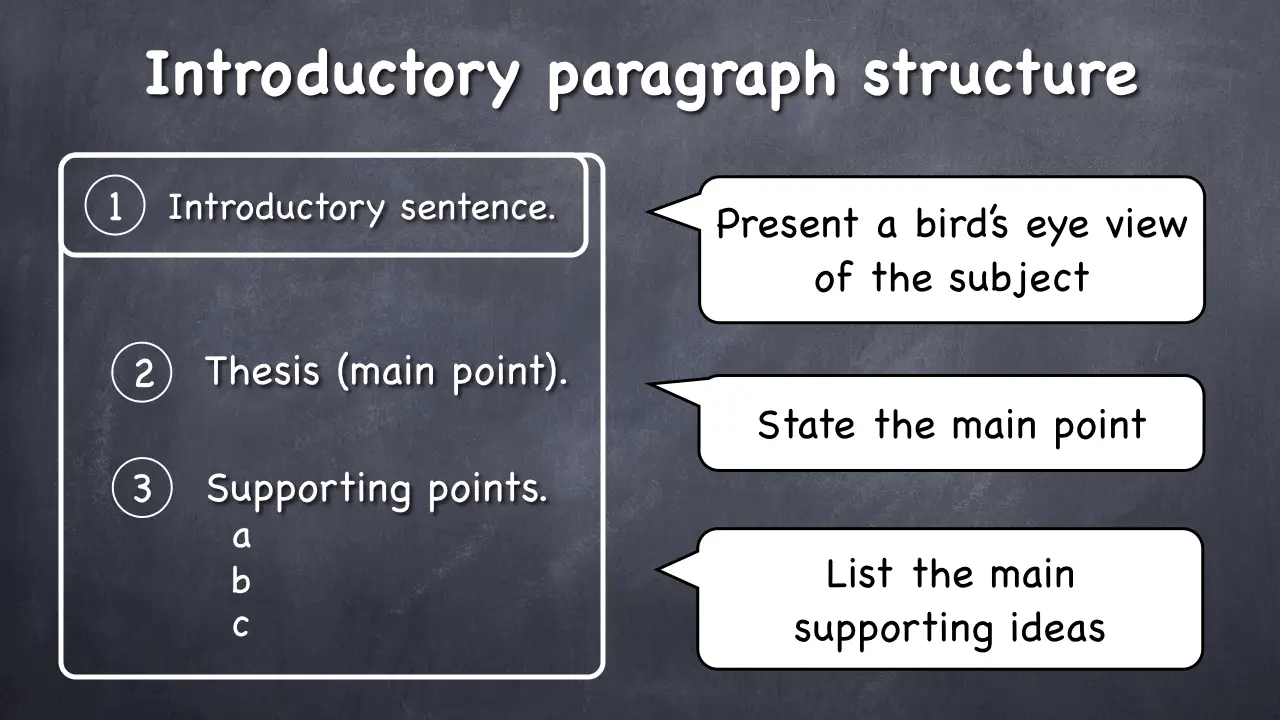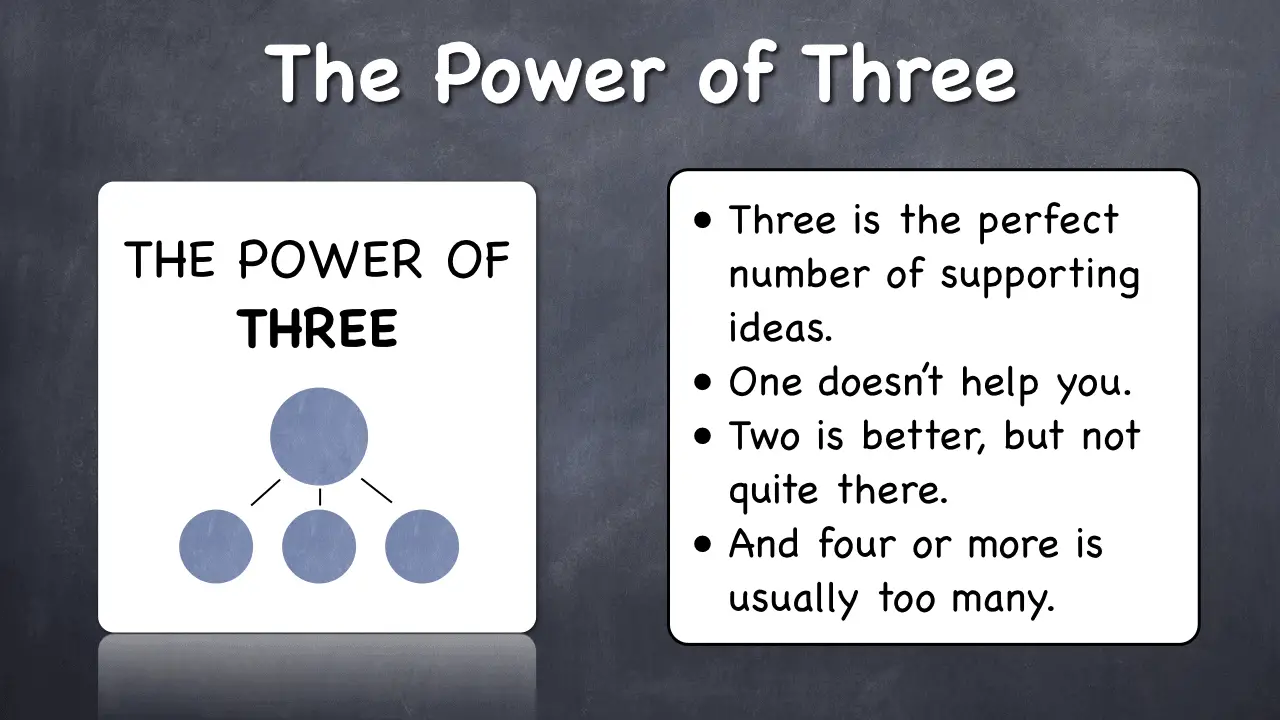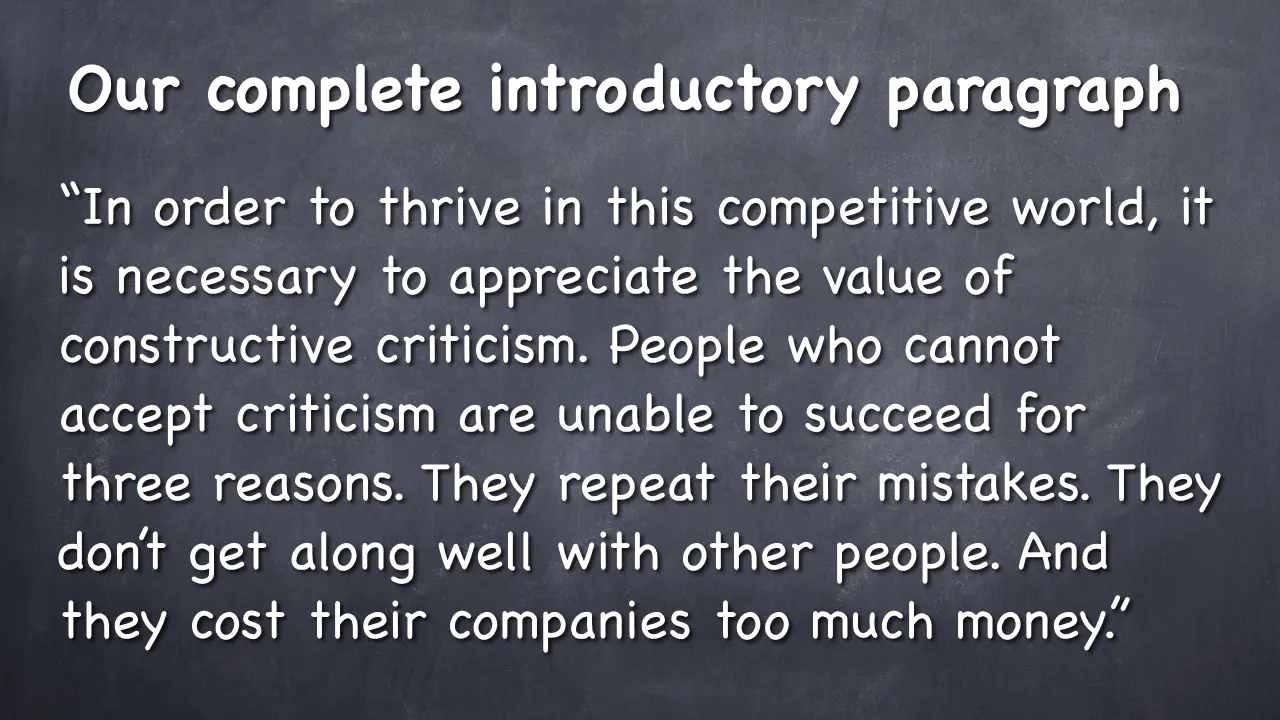An expository essay, also known as an argumentative essay, starts with an introductory paragraph.
This paragraph is structured the following way:
- Introductory sentence or two
- One sentence that states the thesis
- One or more sentences that enumerate the supporting points
Here is the diagram of a structure of an introductory paragraph:

Writing the introductory paragraph is a 4-step process:
- Pick your subject and write down your main point.
- Find the ideas to support your main point.
- Write the main and the supporting points as one paragraph.
- Add the introductory sentence.
I’m Tutor Phil, and in this tutorial I’ll show you exactly how to start your essay. Let me take you through this process step by step.
Step 1. Pick your subject and write down your main point.
Your subject is what your essay is about. Is it about education? Is it about health? Is it about human psychology?
Those are very general topics. Yours should be a little more specific.
Let’s say we want to write about human psychology, and our subject is inability to take criticism.
Now we know what we’re writing about. But the next question is, what do we want to write about it? Let’s think. What happens to people who cannot tolerate criticism?
Well, it is probably hard for them to get ahead in life. It seems logical that this quality would make it hard for them to succeed.
Now, let’s write down our complete thesis (main point) in one sentence:
“People who cannot accept criticism are unable to succeed.”
Great! We have completed step 1 and are ready for the next step.
Step 2. Find the ideas to support your main point.
I always recommend that my students use the Power of Three to think up their supporting points.

This simply means that you need only three supporting ideas; no more and no fewer. Three is a very comfortable number for the human brain and makes your life so much easier.
We need three supporting ideas. To find them, first we need to determine if our thesis is a “Why” or a “How” statement. In other words, does our thesis sentence answer the question “Why?” or the question “How?”
Let’s test it and see. Let’s simply ask the two questions and see which form makes sense:
“How are people who cannot accept criticism unable to succeed?”
“Why are people who cannot accept criticism unable to succeed?”
Just by reading these two questions aloud, I think you’ll hear that the second, the “Why” question just sounds better and more sensible.
If our thesis answers the question “Why?,” then our supporting points are reasons. I’ll show you how to deal with a “How” question in a later example.
Let’s use the Power of Three and find out what are the reasons that people who cannot take criticism fail in life:
- They cannot succeed because they repeat their mistakes.
- They cannot succeed because they don’t get along well with other people.
- They cannot succeed because they cost their companies too much money.
We now have our three supporting points, and we’re ready for the next step.
Step 3. Write the main and the supporting points as one paragraph.
All we have to do in this step is write out our main and supporting points as complete sentences in one paragraph. Let’s do it:
“People who cannot accept criticism are unable to succeed for three reasons. They repeat their mistakes. They don’t get along well with other people. And they cost their companies too much money.”
Awesome! We have our complete thesis statement. And we’re ready for the next and final step.
Step 4. Add the introductory sentence.
Just one introductory sentence is usually enough. Write two at the most. Your introductory sentence should simply put your main point in perspective.
This means that you’re pulling your reader from the world at large into the world of your essay. It’s like a funnel. Your reader is sucked in from the general world into your specific subject.
Let’s write one for our thesis statement. We are introducing the point that people who resist criticism have a hard time succeeding. Let’s introduce this thesis:
“In order to thrive in this competitive world, it is necessary to appreciate the value of constructive criticism.”
This sentence does indeed look like a funnel. It starts out very generally by talking about the “competitive world.” And then it narrows down to the idea of constructive criticism.
Now, the reader is well-oriented in the subject matter of this essay and prepared for the main point.
Let’s put the entire introductory paragraph together and read it to hear how it sounds.

This opening paragraph sounds great. This is how you start an essay.
As a result of completing these four steps,
- You have a thesis statement, which is a full paragraph
- You have a map in your mind of what your whole essay will look like
- Instead of one huge idea, you have three smaller, more digestible ideas
- You’re ready to write the rest of the essay.
Introductory paragraph example: “The tsunami of 2011”
Let’s do another example and pretend that your professor wants you to write about a natural disaster.
Step 1. Pick the subject and write down the main point.
Our subject can be the tsunami that took place in Japan in 2011. What can we say about it? We can discuss its consequences and state our main point this way:
“The tsunami of 2011 devastated Japan.”
Step 2. Find the supporting ideas.
Let’s first find out if this is a “Why” or a “How” thesis sentence by comparing these two questions:
“Why did the 2011 tsunami devastate Japan?”
“How did the 2011 tsunami devastate Japan?”
This time, the “How” question makes a lot more sense. We really want to know the extent of the devastation rather than what caused the tsunami.
To ask “How” really means to ask “In which ways?” or “In how many ways?”
And now we’re using the Power of Three and looking for three ways in which the tsunami devastated Japan. Let’s find them:
- It killed over 900 people
- It had a huge negative impact on Japan’s economy
- It created a great radioactive threat
Step 3. Write the main and the supporting points as one paragraph.
We have everything we need to complete this step, so let’s do it:
“The tsunami of 2011 devastated Japan. It killed over 900 people. It had a huge negative impact on Japan’s economy. And it created a great radioactive threat.”
Step 4. Add the introductory sentence.
Let’s introduce this topic and write out the complete introductory paragraph:
“People should not underestimate the power of nature to wreak havoc on entire countries. The tsunami of 2011 devastated Japan. It killed over 900 people. It had a huge negative impact on Japan’s economy. And it created a great radioactive threat.”
If you read the whole paragraph, you’ll hear how it flows from general to specific.
If you start writing your essay this way, you’ll have everything you need to write the rest of the essay.
Tips on How to Start an Essay
Use the analogy of an airplane takeoff.
Writing essays is similar to flying in an airplane. It is just as hard for you to begin writing an essay as it is for an airplane to take off.
The plane’s engines have to lift the huge weight of the airplane. Similarly, your brain has to gain momentum, trying to figure out what to write and where to get the content.
But as soon as the plane has gained the necessary speed, it’s smooth sailing from the on, because it is much easier to keep momentum than to gain it.
Once you’ve started your essay the way I just showed you, writing the rest of the essay is a lot easier. You now have some powerful momentum and know exactly what to write in the body of the essay.
Decide on your main point quickly.
Step 1 in the process I just showed you doesn’t have to take long. Just pick a topic and decide without doing extensive research.
You can do the research later to confirm your stated main point. But come up with a complete thesis quickly; don’t waste your time.
For instance, in the tsunami example above, I simply decided that it “devastated Japan.” I did that because I strongly suspected that that was the case.
I did not conduct a lot of research, or any research for the matter, to simply decide on that main point.
Students often spend too much time researching something before actually sitting down to write the first sentence. Don’t do that. This is why you have these steps and the Power of Three.
Just decide that this is going to be your main point, and these will be the supporting points. And then go ahead and research the support.
This way, you’ll be a lot more focused, and your essay writing process will go a lot more smoothly and quickly.
Hope this was helpful! Now go ahead and start writing that essay!
Tutor Phil.
